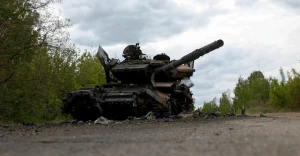
Influential NATO countries remain Russia-centric regarding Europe’s security and are not ready for Russia’s defeat – political scientist Holobutskyi
Political technologist Oleksiy Holobutskyi is convinced that certain Western allies of Ukraine are not ready for the defeat of the Russian Federation in the war
He stated this on Espreso.
“At present, it is not right to blame our delegation in Vilnius for asking for more at the NATO summit. Diplomacy's appropriateness and understanding are important factors to consider. When you request something from your partners that cannot realistically be fulfilled now, it is also necessary for the domestic audience,” he explained.
According to Holobutskyi, some NATO leaders are not prepared to completely cut ties with Russia.
“We found out that we would not receive a specific date for joining NATO a few weeks before the summit in Vilnius. Certain events occurred, the full impact of which we still do not understand. The United States and the influential European countries in NATO are still focused on Russia when it comes to Europe's security. Ukraine has become a means for them, rather than a primary goal. Unfortunately, at the moment, our allies are not ready for Russia's defeat in this war,” he added.
Vilnius summit and Ukraine’s NATO accession
The NATO summit took place in Vilnius on July 11-12. The meetings were attended by leaders and government officials from various countries. Lithuania hosted the summit for the first time at the LITEXPO congress center. Security was ensured by thousands of military personnel, and the airspace was protected by air defense systems.
Leaders from 31 NATO countries, including US President Joe Biden, participated in the meetings. Delegations from Japan, South Korea, New Zealand, Australia, Ukraine, and Sweden were also invited. Over 2,400 members from 48 foreign delegations, including heads of state and government officials, were expected to attend. Ukrainian President Volodymyr Zelenskyy was also present.
During the summit on July 11, a decision was made regarding Ukraine. The Membership Action Plan stage was canceled, and Ukraine will receive an invitation to join the Alliance once it fulfills the entry requirements and gains the agreement of all NATO allies.
President Zelenskyy expressed his dissatisfaction with the conditions attached to Ukraine's invitation, stating that it seemed like a lack of readiness to invite Ukraine to NATO.
The Alliance agreed on a final communiqué concerning Ukraine, reaffirming the commitment made in 2008 that Ukraine would become a NATO member. The document acknowledged that Ukraine's path to Euro-Atlantic integration has exceeded the requirements of the Membership Action Plan. The member countries recognized Ukraine's progress in operational and political integration with NATO, as well as its significant reform efforts. Progress will be regularly assessed through the Annual National Programme.
Ukraine's Foreign Minister, Dmytro Kuleba, responded to the summit's decision by emphasizing that NATO should not delay Ukraine's accession to the military-political bloc. He also noted that the specific conditions for joining and who should formulate them were not yet known.
President Zelenskyy commented on the summit's results, expressing that if Ukraine receives an invitation to join NATO, it would be an ideal outcome.
On July 12, the G7 countries reached a joint declaration specifying security guarantees for Ukraine. Countries willing to join the agreement will have the opportunity to do so.
Subsequently, President Zelenskyy, who initially criticized the summit's decision, acknowledged that any doubts and ambiguities regarding Ukraine's NATO membership were now removed. He stated that Russia would no longer have a barrier blocking NATO's door.
For more information about the NATO summit, you can follow the link.
- News













































